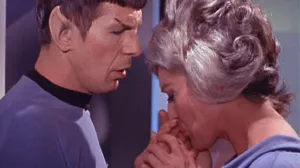The Futurama episode Jurassic Bark has gone down in history as one of the most beloved episodes of the long-running animated comedy…as well as one of the hardest to watch. In the episode, Fry’s beloved dog Seymour was revealed to have spent years waiting for his best friend to return, ultimately hanging around the pizzeria where Fry worked for years and passing away there after the delivery boy was inadvertently lost in a cryogenic tube and woke up a thousand years in the future. The episode is one of the first things to come up in any Futurama conversation.
Videos by ComicBook.com
The series actually later reneged on this a bit, giving Seymour a happier ending (via the magic of clones!), which didn’t thrill most fans. As sad as “Bark” was, after all, it was a great example of the humanity at the core of Futurama, which helped the series rise above its broad characters and wacky concepts.
“we always tell ourselves that we make choices for the good of others, and those stories we tell ourselves are often convincing, but it doesn’t mean they’re always true, Futurama writer Eric Kaplan told Slate, who jokingly asked him whether the goal of the episode was to crush the audience’s souls. “So the point of that episode is Fry tells himself a story that Seymour never would have waited for him, and he would have wanted him to go on with his life. And you can see why that story is useful for Fry to believe. But it’s not true. Primo Levi writes about Auschwitz, and he says that no one who has ever seen the Gorgon ever reports back what it was like. So we’re all in a position of ignorance writing about death. Maybe one of the emotional roles that stories play is that they let us experience an ending. In real life, the one ending that we’re gonna have, we don’t get to report back. So by having a story that has an ending, we kind of get to imagine what it would be like to have the ending, a death, and then come through to the other side and have some sort of perspective on it.”
In terms of the revelation that Seymour got to live out much of the rest of his life in blissful happiness with a Fry clone, Kaplan said he didn’t want to criticize the work of other writers in public.
Still, he said, “that’s what we would call, in the philosophy trade, some nutty baseball.”








